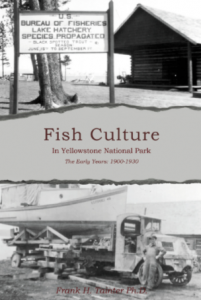Exploring the Forgotten History of Yellowstone’s Fish Culture Era
Dr. Franklin H. Tainter reveals how early conservation shaped modern environmental stewardship.
YELLOWSTONE NATIONAL PARK, WY, VENEZUELA, October 8, 2025 /EINPresswire.com/ -- Fish Culture in Yellowstone National Park: The Early Years, 1900–1930 by Dr. Franklin H. Tainter, published by Bookside Press in November 2022 (ISBN-13: 978-1998784776), is a meticulously researched historical nonfiction work in the State & Local History of the U.S. genre.
This landmark study examines the formative decades of fish culture—breeding, stocking, and management—within Yellowstone National Park during the early 20th century. It reveals how early conservationists, park managers, and scientists sought to “improve nature” through intervention, often unaware of the far-reaching ecological consequences. Through a lens of history and environmental science, Dr. Tainter illuminates the transformation of Yellowstone’s aquatic ecosystems and the birth of modern conservation ethics.
In Fish Culture in Yellowstone National Park: The Early Years, 1900–1930, Dr. Franklin H. Tainter offers a compelling look at a formative period in environmental management. This richly documented book explores how the U.S. government and park officials approached aquatic resource management when ecological awareness was still in its infancy. Drawing from archival materials, personal letters, and early scientific reports, Dr. Tainter reconstructs the story of Yellowstone’s hatcheries, the introduction of non-native fish species, and the motivations behind these interventions—ranging from tourism and recreation to national pride.
The book reveals how such well-intentioned efforts reshaped the park’s fragile aquatic systems, displacing native species and forever altering biodiversity. Yet beyond the ecological narrative, it delves into the evolution of American conservation thought—from dominion over nature to partnership with it.
“In researching early conservation practices in Yellowstone, I discovered that the story of fish culture was more than technical—it was deeply human,” says Dr. Tainter. “It’s about how ambition, science, and belief collided in a quest to perfect nature.”
Blending environmental history with human insight, this work challenges readers to reflect on the past and reconsider humanity’s ongoing relationship with the natural world.
Fish Culture in Yellowstone National Park: The Early Years, 1900–1930 uncovers how human ideals and interventions have shaped the natural landscapes we cherish. It reveals the paradox of early conservation efforts—guided by good intentions yet often leading to lasting ecological imbalance. Through its detailed research and compassionate storytelling, the book emphasizes:
How faith in progress and scientific control defined early wildlife management.
The consequences of altering ecosystems under the guise of preservation.
The ongoing dialogue between human ambition and environmental responsibility.
The recognition that history is not just about the past—it is a mirror reflecting our values today.
Dr. Tainter invites readers to consider how our choices, whether in managing a species or protecting a landscape, shape both our environment and our identity as stewards of the Earth.
About the Author
Franklin Hugh Tainter, Ph.D., is a renowned forestry and plant pathology expert whose distinguished career spans over four decades in academia, research, and consulting. A graduate of the University of Montana (B.S.F.) and the University of Minnesota (M.S., Ph.D.), Dr. Tainter held professorships at the University of Arkansas and Clemson University, where he mentored future scientists and conservation leaders.
With over 150 scientific publications, his pioneering research on forest diseases, fungal pathogens, and ecosystem health has gained international recognition. His groundbreaking discoveries regarding Phytophthora species in Mexico and Ecuador have contributed to global understanding of plant pathology and forest sustainability.
Beyond his scientific work, Dr. Tainter has dedicated his later years to bridging science and culture through consulting, children’s educational books, and creative writing—including a novel inspired by his Peace Corps experiences in Chile. His work continues to inspire curiosity, respect for nature, and an enduring commitment to the preservation of our shared planet.
Book Details
Title: Fish Culture in Yellowstone National Park: The Early Years, 1900–1930
Author: Dr. Franklin H. Tainter
Genre: Historical Nonfiction / State & Local History of the U.S.
Publisher: Bookside Press
Publication Date: November 2022
ISBN-13: 978-1998784776
Dr. Franklin Hugh Tainter
WEST HARMONY PRODUCTIONS LLC
email us here
Legal Disclaimer:
EIN Presswire provides this news content "as is" without warranty of any kind. We do not accept any responsibility or liability for the accuracy, content, images, videos, licenses, completeness, legality, or reliability of the information contained in this article. If you have any complaints or copyright issues related to this article, kindly contact the author above.


